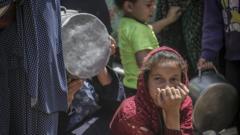Denial of essential food supplies to Gaza has been branded as a "weapon of war" by Philippe Lazzarini, the commissioner-general of the United Nations Relief and Works Agency (UNRWA). Speaking to BBC News, Lazzarini expressed grave concern over the ongoing humanitarian disaster affecting more than two million people in Gaza, where starvation and acute food insecurity are rampant due to Israel's blockade. Since the resurgence of hostilities in March, humanitarian aid, including food and medical supplies, has been severely restricted, exacerbating the plight of civilians caught in the conflict.
According to Lazzarini, civilians in Gaza are grappling with a daily struggle for survival marked by extensive displacement and lack of access to basic necessities. "People are exhausted, people are hungry... in the coming weeks, we can expect that people will not die because of the bombardment, but they will die because of the lack of food," he stated. His comments were echoed by Pascal Hundt from the International Committee of the Red Cross, who underscores the relentless challenges faced by Gaza's population amidst escalating violence.
In recent weeks, Israel resumed military operations, leading to fears of an intensified offensive. Prime Minister Benjamin Netanyahu has vowed an aggressive approach following criticisms from nationalist factions within his government, pushing for further displacement of Gazans—a situation that has already seen hundreds of thousands fleeing amidst ongoing air strikes. Lazzarini emphasized the hazardous situation for civilians, noting that humanitarian conditions have become increasingly desperate, with the latest assessments indicating that Gaza is on the brink of famine.
The Integrated Food Security Phase Classification (IPC) reported alarming data, revealing that around 470,000 Gazans are experiencing catastrophic levels of food insecurity. Despite the dire situation, aid organizations have rejected claims that Hamas controls and misappropriates food supplies. Lazzarini asserted that the systematic denial of food aid functions as a political lever, a perspective that highlights potential violations of international humanitarian law.
Criticism of Israel's blockade has intensified, with claims of its implications for potential genocide echoing from international observers. Lazzarini stated that the mass devastation of communities and infrastructure in Gaza constitutes serious atrocities, while Israel’s defense minister has openly acknowledged the tactic of blockade as essential for achieving military objectives. As the crisis deepens, there are mounting calls for accountability, with international calls for investigations into potential war crimes gaining traction.
In the face of this humanitarian catastrophe, international response remains fragmented, with some world leaders calling for urgent humanitarian action, while others, like Netanyahu, express steadfast support for military decisions. The Israeli-Palestinian conflict continues to evolve, raising significant questions about the future of Gaza and its people amid a backdrop of global outrage and diplomatic indifference.


















